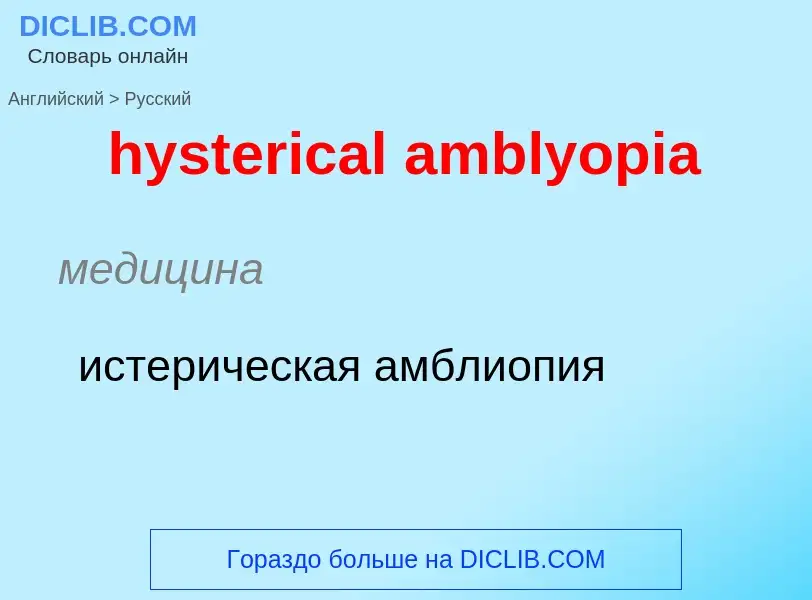Vertaling en analyse van woorden door kunstmatige intelligentie ChatGPT
Op deze pagina kunt u een gedetailleerde analyse krijgen van een woord of zin, geproduceerd met behulp van de beste kunstmatige intelligentietechnologie tot nu toe:
- hoe het woord wordt gebruikt
- gebruiksfrequentie
- het wordt vaker gebruikt in mondelinge of schriftelijke toespraken
- opties voor woordvertaling
- Gebruiksvoorbeelden (meerdere zinnen met vertaling)
- etymologie
hysterical amblyopia - vertaling naar russisch
медицина
истерическая амблиопия
[æmbli'əupik]
медицина
страдающий амблиопией
прилагательное
медицина
страдающий амблиопией
[æmbli'əupiə]
медицина
амблиопия
двоение
существительное
медицина
амблиопия
Wikipedia

Amblyopia, also called lazy eye, is a disorder of sight in which the brain fails to fully process input from one eye and over time favors the other eye. It results in decreased vision in an eye that typically appears normal in other aspects. Amblyopia is the most common cause of decreased vision in a single eye among children and younger adults.
The cause of amblyopia can be any condition that interferes with focusing during early childhood. This can occur from poor alignment of the eyes (strabismic), an eye being irregularly shaped such that focusing is difficult, one eye being more nearsighted or farsighted than the other (refractive), or clouding of the lens of an eye (deprivational). After the underlying cause is addressed, vision is not restored right away, as the mechanism also involves the brain. Amblyopia can be difficult to detect, so vision testing is recommended for all children around the ages of four to five.
Early detection improves treatment success. Glasses may be all the treatment needed for some children. If this is not sufficient, treatments which encourage or force the child to use the weaker eye are used. This is done by either using a patch or putting atropine in the stronger eye. Without treatment, amblyopia typically persists. Treatment in adulthood is usually much less effective.
Amblyopia begins by the age of five. In adults, the disorder is estimated to affect 1–5% of the population. While treatment improves vision, it does not typically restore it to normal in the affected eye. Amblyopia was first described in the 1600s. The condition may make people ineligible to be pilots or police officers. The word amblyopia is from Greek ἀμβλύς amblys, meaning "blunt", and ὤψ ōps, meaning "sight".


